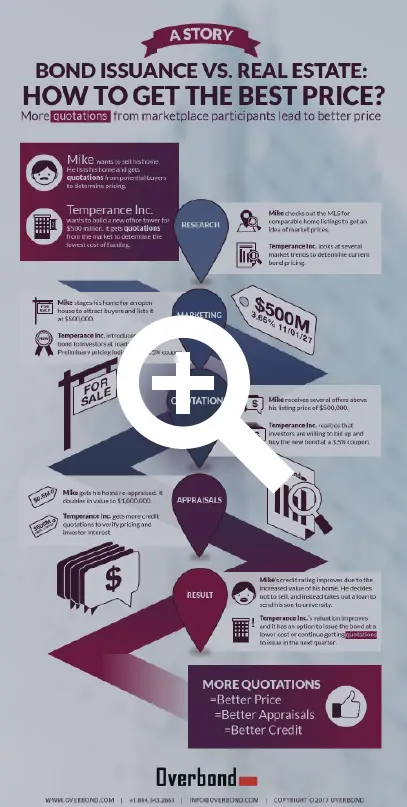Issuing new bonds is a means for governments and companies to raise capital (through
issuing debt) in order to grow their business or finance new projects. Most people are familiar with the IPO (initial public offering) process for issuing a new stock, but many are less familiar with bond origination, or the process of issuing a new bond. Documentation, pricing and communication are key to structuring a successful new issue, determining the best pricing, and for informing investment decisions.
Similar to the residential real estate market, bond origination involves diligent research and third party agents or networks to effectively match supply and demand. In this article we use the idea of selling a home as an analogy to explain the considerations in issuing a new bond into the capital markets. Given the sizeable value of these transactions, the importance of supply and demand discovery through quotations, industry comparables and appraisals are integral to determining the best pricing.
Overview of steps involved:
- Research and planning: assessing current market conditions and getting professional advice
- Marketing: marketing the deal and getting initial interest
- Quotations and comparables: getting quotes from comparable listings and transactions
- Appraisals: re-assessment to zone in on pricing
- Result: making a final decision based on most recent market insights
1. Research and Planning
CORPORATE BOND MARKET
Average time: 2 - 3 months
Corporate treasury departments within an issuing company begin research months before
issuing a new bond. They aim to lower their cost of capital of the firm and therefore analyze a number of market signals, including:
- Any of the company’s upcoming bond maturities and financial requirements
- Benchmark rates (which are Government of Canada bond yields, ranging from 2 to 30 years)
- Credit rating agency considerations
- Credit spreads
- Recent industry new bond issuance prices
- Analyst commentaries about sector trends
- Secondary market valuation (where their outstanding bonds are currently trading)
Once the high level decisions for the new bond have been made (ie. the size of the issue, the tenor, fixed or floating coupon, spread guidance), issuers work with the debt capital markets (
DCM) network and professionals to refine the optimal structure, terms and price. In preparation for a potential offering, legal counsel supports the issuer in the event they have any questions surrounding securities law.
RESIDENTIAL REAL ESTATE MARKET
Average time: 2 - 3 months
Any big purchase or major sale always starts with initial research. Unlike the bond markets, which have limited public information available, the real estate market is characterized by a digital and centralized hub of all current property listings: the
MLS, or Multiple Listings Service.
Buyers and sellers both use the MLS as their benchmark rates for location, building type, age and size. Just as with bond issuers and investors, each counterparty has their own specific criteria to consider, but ultimately need to settle on a price and terms that makes sense. Some of the factors that both buyers and sellers will spend time researching are:
- Similar listings
- Recently sold comparables
- Pending sales
- Square foot cost comparisons
- General market trends (is it a seller’s market or a buyer’s market?)
2. Marketing
CORPORATE BOND MARKET
Average time: 1 - 2 weeks
Bond issuers typically host a roadshow to introduce and
market the new bond to their investor base. Marketing a new bond is performed using an increased number of touchpoints with investors, and in recent years has leveraged digital channels to reach a wider audience.
Should an investor be interested in purchasing the potential new issue, they can send an indication of interest (“IOI”) to the issuing company. An
IOI is a conditional and confidential non-binding interest in buying a new issue, and will usually disclose an amount and a spread (ie. $10M of a $100M offering or 10% of a new issue). Issuers have the option of keeping the IOI anonymous or making the information available to third parties involved, such as investment dealers, investor relations and legal counsel.
RESIDENTIAL REAL ESTATE MARKET
Average time: 3 - 4 weeks
Marketing a home for sale draws mostly on the buyer’s and real estate agent’s network, home staging efforts and open houses. Viewings by prospective buyers are by far the most important step in the sales cycle. Leveraging social media channels like Facebook and Youtube are also important in spreading local awareness.
In recent years, new digital and tools such as
TheRedPin,
Compass and
RedFin have allowed buyers and sellers to leverage a wider digital network to access quotations from the marketplace and even arrange viewings. Digital networks and real-time quotations allow for more breadth and coverage as home buyers increasingly turn to
online channels to research, view, and even source financing for the entire process.
"Digital networks and real-time quotations allow for more breadth and coverage as home buyers increasingly turn to online channels to research, view, and even source financing for the entire process."
3. Quotations and Comparables
CORPORATE BOND MARKET
Average time: 1 - 4 weeks
Being able to receive pricing quotations on a regular basis is important to accurately assess market sentiment, so that issuers can take advantage of desirable conditions. A typical bond deal from a seasoned issuer could easily raise $500 million, in which a single basis point or bps (0.01%) difference can equate to millions of dollars of interest cost savings to an issuer. Maintaining coverage of bond markets through digital networks for market research and pricing data ensures that they are in a position to seamlessly issue a new bond anytime.
Issuers and investors also rely on
credit rating agencies to determine bond pricing. The rating reflects the company’s ability to sustain and pay interest and overall creditworthiness.
Bond credit spreads are inversely correlated to their ratings, which typically range from AAA (the highest grade, and thus the lowest spreads) to D. Each bond is rated at the time it is issued, and the rating is periodically reevaluated to determine whether a ratings change is warranted or the outlook (Positive/Negative/Stable) on the credit or its sector should be revised.
RESIDENTIAL REAL ESTATE MARKET
Average time: 1 - 2 weeks
Arriving at a
selling price for a home is the single most important factor to consider, and usually guided by market feedback on pricing. Prospective buyers send offers of desired pricing and sellers receive quotations for review before going ahead with the transaction. To maximize the pricing potential, sellers can leverage digital networks to receive quotations from a large base of buyers that they would not have been able to reach through traditional manual processes.
Just like bond ratings, home buyers are required to undergo a credit check by a certified third party to determine their credit score, which is a major factor in calculating the mortgage amount they are eligible to receive. This in turn reflects the buyer’s overall budget and any bids on prospective homes.
4. Appraisals
CORPORATE BOND MARKET
Average time: 1 - 2 weeks
Uncovering the optimal price for a borrower involves countless phone calls, emails and discussions confirming investor interest and issuer reflections on their own firms’ cost of funding.
An upward price movement through healthy quotations is one of the leading indicators of an issuer’s credit or borrowing program strengthening. Ratings agencies periodically adjust ratings upward based on the company’s fundamentals. Access to timely pricing information is key for determining fair market values and the best pricing for a new bond.
"A single basis point or bps (0.01%) difference in a new bond issue could equate to millions of dollars of interest cost savings to an issuer."
RESIDENTIAL REAL ESTATE MARKET
Average time: 1 - 2 weeks
Home sellers will typically get their homes re-appraised during the research or marketing process, especially if there are multiple expressions of interest. A
home appraisal provides an up to date current market value for a home, and is conducted by a professional appraisal company after an offer to purchase has been accepted, but before the buyer takes possession. Similar to new bonds, increased quotations and demand often leads to an upward price movement, and improves the seller’s credit score.
5. Result
CORPORATE BOND MARKET
Average time: 1 day
Having more market insight equips issuers to maximize their cost savings when the decision is made to issue new bonds. An issuer may decide to not launch the deal, but rather postpone it to a future date when they can take advantage of better pricing terms. Unlike purchasing a home, there are oftentimes north of 20 investors who participate in an offering, with each investor receiving an allocation based on their indication of interest, pricing sensitivity and relationship to the issuer.
RESIDENTIAL REAL ESTATE MARKET
Average time: 1 day
Upon receiving more quotations and market insights, home sellers may delay selling their home in anticipation of getting a better price in the near future. Sellers can leverage a higher valuation in the appraisal and multiple offers as an opportunity for refinancing their mortgage at a better rate, or plan to relist their home in the future at a higher price.
"Overbond is quickly changing the fixed income landscape with its innovative digital platform that helps bond issuers and investors with every step of the bond origination process."
The importance of quotations has led to significant value for sellers (homeowners) and issuers (corporations or governments). In both cases, credit can be strengthened without entering into a transaction. Getting regular quotations allows the issuer or seller to keep pulse of market sentiment and pricing information ahead of a potential deal. It is healthy behaviour to get regular quotations and updates to gauge the price of significant assets, much like going to the doctor for regular checkups to minimize the risk of major setbacks or disruptions.
The introduction of digital networks have helped increase market liquidity by providing a central hub for quotations, market data and connectivity between all stakeholders in the real estate market. Until now, there is no equivalent of a central hub for primary bond issuance. Overbond is quickly changing the fixed income landscape with its innovative digital platform that helps bond issuers and investors with every step of the bond origination process.
The result of this digitization is that it will bring debt capital markets into the
21st century - allowing these markets to become more efficient. Issuers are able to access better market data, quotations and appraisals to determine the optimal pricing and timing of a new issue. Investors will spend more time generating trade ideas and reflect their interest directly to the platform. All market participants will access a far wider market than they do currently, and will be able to do so on the back of an increased foundation of trust that results from a fully transparent, centralized repository of historical market information for the entire bond market.











